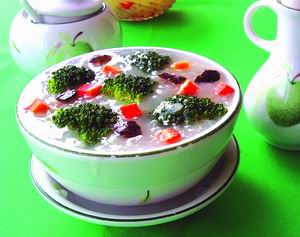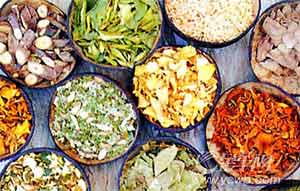Chinese Way
Ultimate guide to health -Traditional Chinese Medicine
Updated: 2007-08-01 10:10
(chinaculture.org)
"Yangsheng" refers to the improvement of health and the prolonging of life through the proper care and nurture of one's body and mind.
Dietotherapy
 |
|
Dietotherapy in Traditional Chinese Medicine (TCM) is a specialty that concerns the study of how to make good use of foods and natural nutriments as well as Chinese medicine to preserve health, prevent and heal diseases, quicken recoveries, and slow aging. |
TCD is based on the fundamentals of TCM in both theory and clinical practice, including for example, the theory of Yin-Yang, Five-Elements, Zang-Fu organs, meridians, etiology and pathogenesis (the study of causes and development of diseases), diagnostic methods, therapeutic principles, and so on.
It is understood in TCM that like herbs, foods also have different natures and flavors, accounting for their actions of reinforcing or reducing, and ascending or descending. Foods are able to balance Yin and Yang, and Qi and blood in the body, according to TCM. To prevent and cure diseases, both foods and medicines can have important effects since they share the same source, are based on the same theory, and have similar medicinal actions; hence, in TCM, food and herbs are combined in clinical use.
Four Natures and Five Flavors
Ancient Chinese people believed that foods, like herbs, could also be classified into "four natures" and "five flavors."
Four Natures
The four natures include "cold," "hot," "warm," and "cool."
The foods of "cold" or "cool" properties can be used to treat hot-natured diseases. The following are foods that are cold or cool in nature: barley, millet, buckwheat, green bean, celery, spinach, lettuce, green cabbage stems, turnips (white), bamboo shoots, lily bulbs, lotus roots, eggplant, tomato, watermelon, white gourds, sponge gourds, cucumber, bitter melons, apples, pears, oranges, bananas, rabbit meat, frog meat, duck meat, duck eggs, crabs, sea couch (grass), freshwater snails, kelp, laver, green tea, soy sauce, table salt, and rock candy.
The "hot" or "warm" foods are used in treating the cold-natured diseases. The foods that are hot or warm in nature include: glutinous rice, Chinese sorghum (kind of cereal grass), pumpkins, hot pepper, ginger, scallions, onions, leeks, mutton, dog meat, and so on.
Besides the four natures, there are other foods that are neutral in nature, like rice, wheat, corn, beans, and so on.
Five Flavors
 |
In terms of the theory of Five Elements, it is held in TCM that the bitter flavor is connected to the heart, sour to the liver, sweet to the spleen, pungent to the lungs, and salty to the kidneys.
Foods with a pungent flavor include: ginger, scallion, garlic, hot pepper, pepper, cayenne pepper, onion, leek, and spirit.
Foods with a sweet flavor include: potato, lotus root, wheat, polished rice, pea, milk, pork, chestnut, date, and honey.
Foods with a sour flavor include: tomato, tangerine, plum, lemon, grape, papaya, haw, cherry apple, pomegranate, and vinegar.
Foods with a bitter flavor include: bitter melon, almond, lily bulb, orange peel, tea, coffee, bitter green, arrowroot, and pig liver.
Foods with a salty flavor include: barley, millet, dried purple seaweed, kelp, jellyfish, pork, beef, crab, and table salt.
Chinese medicated diet
According to TCM theory, a Chinese medicated diet has not only the efficiency of medicine but also the delicacy of food, and can be used to prevent and cure diseases, build up one's health, and prolong one's life.
The characteristics of a Chinese medicated diet are as follows:
Laying Stress on the Whole, Selecting Medicated Diet on the Basis of Differential Diagnosis
"Laying stress on the whole, selecting medicated diet on the basis of differential diagnosis" means that when doctors prescribe a medicated diet, they should first make an overall analysis of the patient's physical and health condition, the nature of the patient's illness, the season the patient got ill in, and the geographical condition, and so on, before forming a judgment on the type of syndrome. Only then should the doctors decide on corresponding principles for dietetic therapy and select a suitable medicated diet.
Take a patient suffering from a chronic stomach condition, as an example. If the patient is suffering from a stomach condition resulting from a cold, he or she should take one kind of medicine, but if the patient is suffering from the same kind of condition brought on by a stomach deficiency, he or she should take another kind of medicine.
Suitable for Prevention and Treatment, Outstanding in Effect
Medicated diets can be used either to treat diseases or for healthy people to improve their health and prevent diseases. This is one of the characteristics in which a medicated diet is different from treatment by medicine. Although a medicated diet is something mild, it has a notable effect on the prevention and cure of diseases, health improvement, and health preservation, according to TCM theory.
Specials

President Hu visits the US
President Hu Jintao is on a state visit to the US from Jan 18 to 21.

Ancient life
The discovery of the fossile of a female pterosaur nicknamed as Mrs T and her un-laid egg are shedding new light on ancient mysteries.

Economic Figures
China's GDP growth jumped 10.3 percent year-on-year in 2010, boosted by a faster-than-expected 9.8 percent expansion in the fourth quarter.